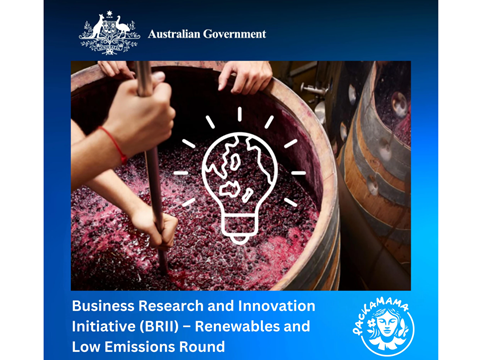
Packamama has received a $100,000 feasibility grant from the Australian government under the Business Research and Innovation Initiative (BRII), to test the technical and commercial viability of creating sustainable packaging for Australian wines.
The grant is part of $1.43 million for wine packaging, safe drinking water, and energy efficiency in commercial fishing, and aims to support Packamama’s viability testing, including some premium wines and longer shelf-life commercial wines.
Supported by the Department of Industry, Science and Resources, and Wine Australia, the initiative seeks to address the challenge of reducing carbon emissions in the wine industry while maintaining the high-quality standards associated with premium wine packaging. Manufacturing wine packaging and transporting packaged wine reportedly accounted for 74% of the industry’s carbon emissions in 2020-21, due to the weight of glass bottles and their energy-intensive production.
Packamama says it hopes to deliver a lighter solution that meets consumer expectations for premium wine quality, building upon its 100% recycled PET eco-flat bottle, designed primarily for commercial wines.
Apparently, key focus areas include researching polymers and performance additives to overcome oxygen permeability and aroma absorption, enhancing shelf life and wine protection; digitally simulating the bottle design and shelf-life performance to achieve the performance and aesthetic standards expected of some premium Australian wines; and exploring manufacturing technologies to enable wide-scale adoption across Australia and beyond.
The project officially commenced on 16th December 2024 and will involve comprehensive feasibility studies over the next four months. Packamama states the initiative aligns with the Australian wine industry’s Emissions Reduction Roadmap, which targets a 42% reduction opportunity that can be achieved by 2030.
Packamama collaborated with Aldi in 2024 to launch ‘flat’ wine bottles made from recycled PET, said to remove 42 tonnes of bottle weight for their first launch. Their flat shape was designed to enable easier stacking and organization in storage for consumers.
Later in the year, Ardagh Glass Packaging-Europe revealed its range of lightweight wine bottles produced in Germany for the European market. The 750ml bottles were said to have a carbon reduction of 12% and a recycled glass cullet level of up to 80%.
If you liked this story, you might also enjoy:
The ultimate guide to the Packaging and Packaging Waste Regulation in 2024
How are the top brands progressing on packaging sustainability?
Sustainable Innovation Report 2024: Current trends and future priorities
Everything you need to know about global plastic sustainability regulation














No comments yet